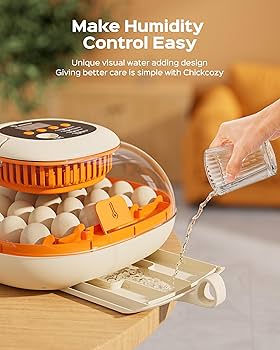Duck eggs are a great addition to your pantry as they last longer than chicken eggs. Their thicker shells also allow them to store for longer in the freezer if you follow proper storage techniques.
Like chicken eggs, duck eggs are a great source of protein and vitamins. They taste delicious and can be used in just about any recipe.

Why Does Egg Freshness Matter?
Eggs are a great way to add protein and vitamins to your diet, but it can be difficult to know when they’re fresh enough to eat. Luckily, there are some simple tests you can do to tell if eggs are still safe to eat.
One of the easiest ways to tell if an egg is fresh is by cracking it open and paying attention to the white and yolk. A fresh egg will have a thick and firm white that stays round and connected to the yolk, while an older egg will have a thinner and runny white that spreads out far away from the yolk.
If you’re a fan of omelets or scrambled eggs, the freshness of your eggs can make all the difference in the world in terms of texture and flavor. However, if you’re cooking something that requires baking, the freshness of your eggs isn’t as important.
When it comes to storing your eggs, it’s best to keep them in the coldest part of your fridge. This is usually the bottom shelves because the cold air sinks.
You can also check the quality of your eggs by examining their shells, which may look dry and uncracked or have a powdery appearance that indicates mold. It’s also a good idea to look at the egg’s yolk and whites for discoloration, which can indicate the presence of bacteria.
Another easy way to determine if an egg is fresh is to use a simple float test. A fresh egg will sink to the bottom of a bowl of water, but an old egg will float on top. This is because as eggs age, their shells become porous, which allows air to flow through them. As the air tries to escape, it expands a pocket of air inside the egg, causing it to float on top.
A rotten egg will emit a sulfur odor, which can be quite unpleasant. If an egg smells rotten, it’s best to throw it out immediately. You can also use your nose to test an egg for freshness: if the egg smells fresh, it will not have much of an odor.
How Long Can You Store Unwashed Eggs?
Whether or not to wash your eggs is a personal choice, and there are many different opinions about the matter. But regardless of your beliefs, if you are buying eggs from a farm or a local store, you should always wash them before eating. In some states, this may be required by law.
In fact, if you have any chicken or duck eggs that are left to sit on the counter, they will last much longer if not washed than if they were washed. This is because fresh eggs have a protective coating known as the bloom (cuticle). The bloom seals the pores of the eggshell, helping to prevent bacteria from entering and contaminating the eggs.
But if you do decide to wash your eggs, be sure to rinse them off completely and quickly. This is especially important if you have any dirt or gunk on them. You can use a paper towel or even your fingernail to scrub away the debris and keep the bloom intact.
Once you have rinsed the eggs, put them in a container and refrigerate them immediately to prevent bacteria from growing inside them. You will want to refrigerate them at a temperature of around 32 degrees Fahrenheit, so they will not spoil too quickly.
If you have a little extra time, you can also soak your unwashed eggs in warm water for a couple of minutes. This will help them to dry faster and prevent them from soaking up any other types of contaminants.
However, be aware that this is not the only thing that can shorten their shelf life if they are not properly stored. If they are not kept in a clean, dark place, they can also become contaminated with mold, fungi and other bacteria.
This can also lead to a rancid taste and smell, which will make them unappealing to consume. When in doubt, the best way to test for freshness is by cracking an egg and placing it in a bowl of water. If it sinks, it is fresh; if it floats to the top, it has spoiled.
When to Discard Stored Eggs
When you buy eggs at a supermarket or farmers’ market, you should keep them refrigerated until you’re ready to use them. This can help them last up to a week or two.
Stored eggs should always be kept in a container that is clearly marked with their best-before date. This will ensure that you know when they’re safe to consume or eat.
Alternatively, you can place them in an egg carton with paper towels at the bottom and top of the egg to absorb moisture that may condense during storage. This will keep the eggs from becoming spoiled or breaking during transit.
If you’re buying chicken eggs at the grocery store, they will generally stay fresh for about a week when unwashed and stored in the refrigerator. However, they can last longer if they are washed and placed in an airtight container before storing them.
Duck eggs, on the other hand, can keep for weeks when stored properly in your fridge. This is because they have a thicker shell that keeps them fresh for up to six weeks, which means you can cook them for an extended period of time without the worry of them spoiling.
In fact, bakers love to use duck eggs in their recipes because they give cakes a richer taste and texture. They also rise higher and stay moist for longer than chicken eggs do, which makes them more suitable for baked goods that need to hold their shape.
The best way to tell if your duck eggs are rotten is to check for an unpleasant smell and discoloration on the shell. If you see these symptoms, discard the eggs, as they’ll most likely be rotten inside.
When you’re storing duck eggs, be sure to place them in a container that is clearly marked with the date of production. You can also keep them in an egg carton or container until you’re ready to use them.
Tips for Extending Egg Shelf Life
If you have your own flock of hens, you will be aware that eggs are one of the gifts that your chickens bring to you. They are nutritious, delicious and make a great addition to any meal. While the average shelf life of a fresh egg is about three months, there are some things you can do to ensure that your eggs stay as fresh as possible for longer.
Firstly, it is important to wash any eggs that are cracked or have fecal matter on them. This will help remove the bacteria that can cause them to spoil. Once cleaned, store them in an airtight container and keep them out of direct sunlight to prolong their freshness.
Another way to extend the shelf life of your eggs is to freeze them. This will keep them fresher for longer and can be done in a freezer-safe container, so you can even preserve them for up to a year or more!
However, eggs in the freezer will lose quality after a certain point and should be eaten within a few weeks. If you would like to store them for a longer time, it is also a good idea to hard-boil them first. This will also help to extend their lifespan, although they will not be as versatile as frozen raw eggs.
When storing hard-boiled eggs, it is best to store them in an egg carton with paper towels at the bottom of the carton, which will help absorb moisture and protect the eggs from condensation. You can also rotate the eggs in a carton every month so that they do not sit in one spot for too long.
If you have a large number of eggs in your fridge, it is also a good idea to store them in an airtight container. This is to avoid the possibility of them absorbing odors and getting damaged from temperature fluctuations in the refrigerator.
A final tip for extending the lifespan of your eggs is to water glass them. This will help to preserve them for a very long time, and it is easy to do at home with some basic ingredients.








